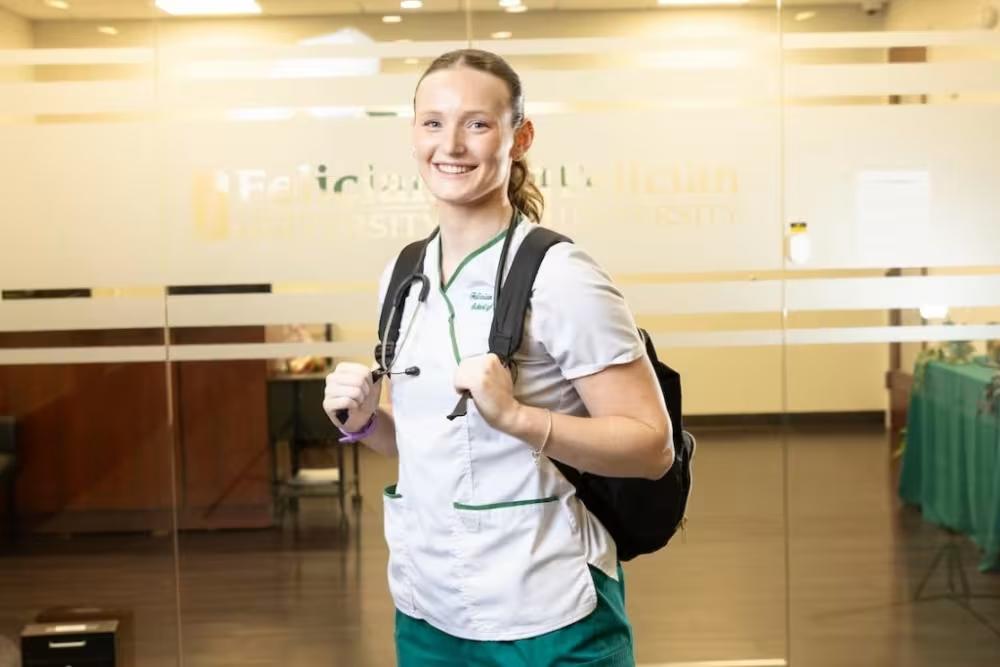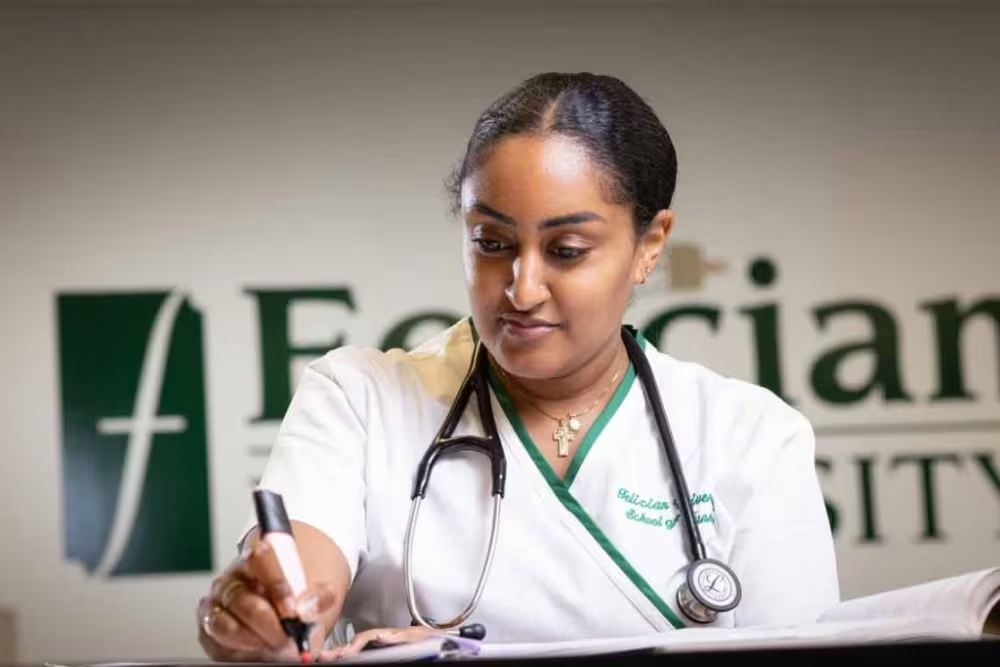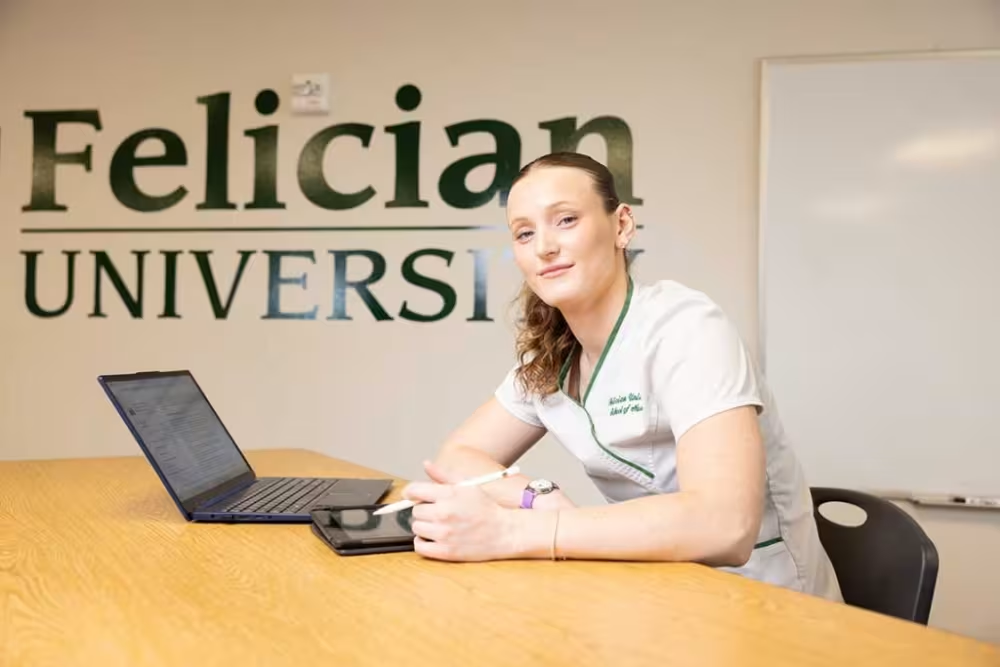Becoming a Nurse with a Non-Nursing Bachelor Degree: Why Now’s the Perfect Time
Each blog post is dated and contains accurate information as of that date. Certain information may have changed since the blog post publication date. If you would like to confirm the current accuracy of blog information, please visit our ABSN overview page or contact admissions at (844) 347-2497.
Is becoming a nurse with a non-bachelor’s degree possible? Yes. Through Felician’s ABSN program, you can apply your bachelor’s degree credits toward a nursing degree. After completing prerequisites, you can earn a BSN in as few as 16 months, pass the NCLEX-RN, and obtain a nursing license.

Nurses save lives. Their care is instrumental in helping people recover from injuries, sickness, and surgeries. They also help change lives. Because they spend more time with patients than physicians, many patients credit the nurses for making them feel comfortable, calming their anxiety, and aiding their recovery.
If you want to change careers and become a nurse, know that becoming a nurse with a non-nursing bachelor’s degree is possible.
At Felician University, the Accelerated Bachelor of Science in Nursing (ABSN) program allows you to earn a Bachelor of Science in Nursing (BSN) in as few as 16 months, so you don’t have to delay your second career any further.
With two program delivery options, a Hybrid program in Parsippany, New Jersey, and an On-Ground program in Rutherford, New Jersey, and multiple start dates per year, you could begin working as a nurse in less than two years.
Why More Adults are Choosing Nursing as a Second Career
Many people are choosing to make the second career nursing transition every day. Nursing is a dynamic career with high earning potential, diverse specialization options, and many advancement opportunities.
In 2024, registered nurses (RNs) nationwide earned a median salary of $93,600. In New Jersey, the median salary is even higher at $102,730.
Nursing also offers many specializations, so you are bound to find the nursing area that best suits your interests and strengths. You can specialize in medical conditions, such as oncology nursing; healthcare environment, such as emergency room nursing; or patient population, such as neonatal nursing.
There are also many ways you can advance your career. You could pursue leadership positions and become a charge nurse, taking on a more administrative role while supervising the nursing staff and providing patient care. If you want to expand your scope of practice, you can return to school and earn a graduate degree to become an advanced practice registered nurse. All these career benefits are available to you, no matter when you start your nursing journey.

Can You Transition from a Bachelor’s Degree to RN? Here’s What You Need to Know
Is transitioning from a non-nursing bachelor’s degree to an RN license possible? Yes, and through an accelerated BSN program, you can transition faster than the traditional route.
An accelerated BSN program builds on your prior education to earn a BSN on an accelerated timeline. ABSN programs offer the same quality of education as a traditional four-year program in less time because general education and foundational courses are completed through your previous college experience and prerequisites.
What is an ABSN Program and How Does it Work?
ABSN programs are a fast track toward earning a BSN. At Felician, students can earn a BSN through the Hybrid ABSN program in Parsippany, New Jersey, or the On-Ground ABSN program at the main campus in Rutherford, New Jersey. Both programs are identical in quality; the only difference is that the hybrid program includes online coursework, while the on-ground program is entirely in-person.
Many students prefer online coursework because it allows them to complete assignments when and where it’s most convenient, provided they meet deadlines and attend in-person proctored exams. Regardless of your chosen course-delivery options, the ABSN curriculum includes:
- Nursing Coursework: The online or classroom nursing coursework lays the groundwork to build skills and develop clinical judgment.
- Nursing Skills and Simulation Labs: Nursing labs allow you to develop core skills and exercise clinical judgment in simulation laboratories, so you can safely practice providing patient care.
- Clinical Rotations: Clinical rotations allow you to provide real patient care in various care settings while under supervision. You will also learn from and network with talented healthcare professionals.

Thinking about relocating for nursing school? Learn why you should consider studying nursing in New Jersey.
Step-by-Step Path to Becoming a Nurse with a Non-Nursing Degree
An accelerated BSN program makes becoming a nurse with a non-nursing bachelor’s degree possible. At Felician University, our admissions counselors are experienced in helping career changers transition from a bachelor’s degree to RN license and start their second career in nursing.
1. Contact an Admissions Counselor
When you fill out the contact form or call, you will be assigned a dedicated admissions counselor who will walk you through each step of the admissions process. During the first call, they will discuss why you want to become a nurse and review your educational history to determine whether the program is right for you.
If the program meets your needs, your admissions counselor will help you put together a plan to meet the admissions requirements in time for your target start date. They will also review your transcripts to determine which of your previous credits apply to prerequisite courses and which courses you must complete before your start date.
2. Complete Prerequisites
Prerequisite courses are a critical part of the admissions process. You must complete all prerequisites before enrollment to enter the program with the foundation needed for advanced science and nursing concepts.
Fortunately, you likely won’t need to complete all prerequisite courses, as the credits from your non-nursing bachelor’s degree could fulfill some of the requirements. As you progress through each course, your admissions counselor will check in to help you stay on track.
At Felician, the ABSN prerequisites include:
- Anatomy and Physiology I and II with labs
- Lifespan Development
- Microbiology with lab
- Pathophysiology
- Principles of Chemistry with lab
- Statistics I
You must also meet the following general education requirements:
- Communication and Expression
- Critical and Analytical Thinking
- Ethics, Values, and Truth
- Faith and Reason
- Global Consciousness
- Information Literacy
- Liberal Arts
- Quantitative and Scientific Reasoning
- Technological Acumen
All prerequisite courses are available online through Felician University for added convenience.

3. Apply to Nursing School
After completing the prerequisite requirements, you can submit your application. At Felician, your application must include:
- All official transcripts
- A resume
- A letter of intent
- Two professional or academic references
4. Earn a BSN
In nursing school, you’ll learn all you need for your second career in nursing. Nursing coursework provides the foundation to build nursing skills in skills labs. You will then develop your clinical judgment in simulation labs and apply all you’ve learned to real-world clinical practice during clinicals.
5. Pass the NCLEX-RN and Apply for an RN License
The final step in becoming a nurse with a non-nursing bachelor’s degree is passing the NCLEX, the nationally recognized nurse licensure exam. The NCLEX is a rigorous and comprehensive exam that assesses your clinical judgment.
Your previous answers determine the number and difficulty of each question, so no one’s NCLEX experience is the same. It’s best to start preparing as early as possible while in nursing school. Because the exam tests your understanding of nursing and patient care, rather than memorization, you should familiarize yourself with the question format early on.
Once you pass the NCLEX, you can register with your state’s board of nursing to obtain a nursing license. Then, you’re ready to start working as a registered nurse.
Why Now is the Perfect Time to Start
Do not delay becoming a nurse with a non-nursing bachelor’s degree; now is the time to start. A national nursing shortage has heightened the demand for registered nurses. This is partly due to retirements outpacing new hires and the growing needs of an aging and chronic disease population.
The BLS projects nursing employment to grow by 6% between 2023 and 2033, translating to nearly 197,200 job openings in that period. By becoming a nurse and joining the workforce now, you are entering a field that needs your skills and expertise. Nursing offers a sense of job security not found in many other professions.
Is nursing a good career? Learn why you should consider the switch to nursing.

Common Questions About Switching to Nursing
Know that you’re not alone in pursuing a second career. Nursing is a diverse and dynamic field with room for people of all ages. Your life experience can enrich your nursing practice. You will enter nursing with the skills acquired through your previous career, such as communication, interpersonal skills, time management, and much more.
Becoming a nurse can be a rewarding career change regardless of where you are in life. Below are a few common questions about switching to nursing that can help you decide whether it’s right for you.
Is it too late to become a nurse?
It’s never too late to become a nurse. ABSN student Dominique started her career in healthcare as a certified nursing assistant for about 16 years before becoming a travel tech and later deciding she wanted to be a nurse.
She chose Felician’s ABSN because it offered a fast track toward earning a BSN, while still allowing her time to be present for her family. When asked what advice she’d offer others in the same position, “Don’t waste time,” she says. It’s going to be hard, but “it’s something you want and it’s attainable.”
Do I need healthcare experience to apply to an ABSN?
While accelerated BSN programs vary, you do not need healthcare experience to apply to the ABSN at Felician University. The ABSN prerequisites ensure all students enter with the foundation necessary to excel in school, while the ABSN curriculum is designed to give non-traditional students the skills they need to become practice-ready nurses.
Additionally, our admissions counselors are experienced in helping non-traditional students through every step of the admissions process.
How long does becoming a nurse with a non-nursing bachelor’s degree take?
It’s possible to start your second career in nursing in less than two years. Through Felician’s hybrid and on-ground ABSN programs, you can earn a BSN in as few as 16 months, not including the time needed to complete prerequisites.
Start Your Second Career in Nursing Today
Becoming a nurse with a non-nursing bachelor’s degree is possible through Felician’s hybrid and on-ground ABSN program. You can graduate with a BSN in as few as 16 months, ready to provide patient care in various clinical environments.
Reach out to an admissions counselor today to take the first steps toward a nursing career.
